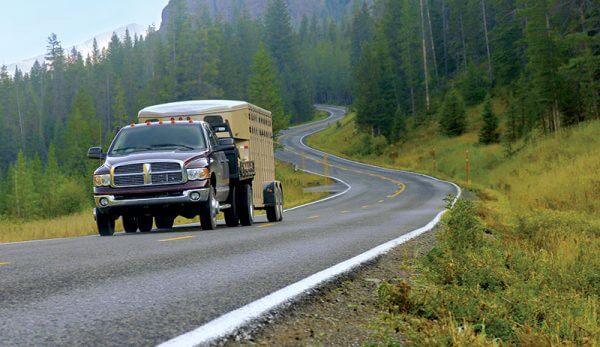Know Before You Tow
Jul 01, 2019

On the farm, it’s a regular course of business for a pickup or flatbed truck to be moving things around. The load might be as small as a few 50-pound bags of feed or as large as a 5-ton tractor. Before you hook up and tow, here are some things to know:
Know Your Weights:
The first step to a safe towing operation is determining your weights – how much both the load you plan to tow weighs, and how much the vehicle is capable of towing (you can often find this information printed on a metal plate or sticker on the vehicle itself).
Next, determine how much your load weighs. For trailers, you will often find the empty weight listed and will either need to weigh the load at a scale or have a pretty good idea how much cargo you are planning on carrying.
Put the Numbers Together:
You know how much you plan to tow and how much your vehicle is capable of towing. It’s simple math, right? Not exactly.
There are some terms you need to know:
• Gross Vehicle Weight Rating (GVWR), the maximum amount of total weight the vehicle can handle including towing and payload.
• Tongue Weight (TW), the downward pressure on the ball by the trailer coupler.
• Gross Combined Weight Rating (GCWR), the total mass of everything — what you’re towing, what you’re putting in the cabin, and the passenger’s weight along with fuel.
Adding this all together and matching it against the vehicle’s GCWR maximum will tell you whether you’re being safe or not.
Towing Safety:
There are several keys when hooking up a load. These keys are:
• Check the hitch and ball, since hitches and balls come in different classes with different maximum weights.
• Check that the brake lights, turn signals and hazards are working properly.
• Hook up the ball completely. Clamp it down and put a pin in the hitch to prevent it from popping free.
• Cross chains for safety.
• Level the load.
• Check tire pressure and wear/tear on all tires.
Your Co-op has a great selection of accessories to make towing easier and safer, including wiring, trailer plugs and couplers, ball mounts, pins, LED lighting, and more. See a professional at your local Co-op store for more details.
Know Your Weights:
The first step to a safe towing operation is determining your weights – how much both the load you plan to tow weighs, and how much the vehicle is capable of towing (you can often find this information printed on a metal plate or sticker on the vehicle itself).
Next, determine how much your load weighs. For trailers, you will often find the empty weight listed and will either need to weigh the load at a scale or have a pretty good idea how much cargo you are planning on carrying.
Put the Numbers Together:
You know how much you plan to tow and how much your vehicle is capable of towing. It’s simple math, right? Not exactly.
There are some terms you need to know:
• Gross Vehicle Weight Rating (GVWR), the maximum amount of total weight the vehicle can handle including towing and payload.
• Tongue Weight (TW), the downward pressure on the ball by the trailer coupler.
• Gross Combined Weight Rating (GCWR), the total mass of everything — what you’re towing, what you’re putting in the cabin, and the passenger’s weight along with fuel.
Adding this all together and matching it against the vehicle’s GCWR maximum will tell you whether you’re being safe or not.
Towing Safety:
There are several keys when hooking up a load. These keys are:
• Check the hitch and ball, since hitches and balls come in different classes with different maximum weights.
• Check that the brake lights, turn signals and hazards are working properly.
• Hook up the ball completely. Clamp it down and put a pin in the hitch to prevent it from popping free.
• Cross chains for safety.
• Level the load.
• Check tire pressure and wear/tear on all tires.
Your Co-op has a great selection of accessories to make towing easier and safer, including wiring, trailer plugs and couplers, ball mounts, pins, LED lighting, and more. See a professional at your local Co-op store for more details.